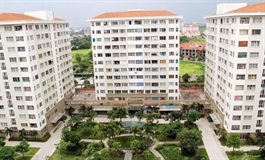Mixed opinions over ministry’s proposal for limited-term apartment ownership
Mixed opinions over ministry’s proposal for limited-term apartment ownership
Mixed opinions have arisen around the Ministry of Construction’s proposal of setting limited terms for apartment ownership, which were repeated in the latest draft amendments to the Law on Housing.

In the draft, which the ministry recently made public for comments, the ministry added a new section on “Term for apartment ownership” with two options.
In the first option, the term for apartment ownership would be defined based on the lifep of the building. In the second option, there would be no change, meaning that there would be no regulation about the ownership term.
Experts said that it was essential to give careful consideration to the proposal of limiting apartment ownership terms because this was a new thing in Viet Nam and could have a significant impact on the market and residents.
The view of the first option was similar to the proposal setting a limited term of 50-70 years for apartment ownership raised four months ago which had caused a stir among the public.
Most residents and experts did not agree with the proposal, pointing out that a limited term for apartment ownership was not appropriate for buildings that were developed on long-term residential land as apartment owners still had the right to own the land in the long term following the established land laws.
Van Quang, who lives in an apartment building in Binh Thanh District, HCM City, said that his family saved up for 10 years to buy the apartment. He was worried he would lose his biggest asset when the ownership term expired.
Another resident said that he planned to sell a house to buy an apartment close to the city centre which was more convenient for traveling to work. However, when he heard about the ministry’s proposal, he changed his mind.
If the proposal was passed, people might rush to buy land instead of apartments and this would cause a problem for the market, he said.
According to David Jackson, general director of property market research firm Colliers Vietnam, in any approach, the Ministry of Construction aimed for stable growth of the real estate market, and clarifying issues related to house ownership and ownership terms was an important part of the process.
It was necessary to have an appropriate approach with a specific roadmap and transparent regulations, which would help diversify the housing market and open up more opportunities for customers and real estate developers, he said.
Limited-term apartment ownership was currently applied in many countries in the world but is a completely new thing in Viet Nam, thus, careful consideration was needed to harmonise benefits and achieve long-term development goals, he said.
Limited terms for apartment ownership were expected to tackle difficulties in urban development and management, he said, pointing out that like other types of housing, the quality of apartment buildings gradually decreased years over years, affecting the safety and life of residents.
He said applying limited ownership terms would also bring many opportunities for redevelopment and change of land use purposes, thereby better serving social needs in the future while providing access to housing for the next generations as land was a finite resource.
Nguyen Duy Thanh, chairman of Global Home, said that it was important to have solutions to handle construction works that expired and ownership issues to protect the legitimate rights of residents.
If the buildings had to be demolished and rebuilt, the old owners should have the right to receive compensation at market prices to settle down, he said, stressing that every building had its lifep and would degrade over time.
In response to the public, Deputy Director of the Housing and Real Estate Market Management Department under the Ministry of Construction Nguyen Manh Khoi told Viet Nam News Agency that the proposal was raised to tackle existing difficulties in the renovation and rebuilding of old and degraded apartment buildings.
Many buildings had been degraded and seriously affected the lives of residents, but it was difficult to demolish and rebuild because ownership was permanent, he pointed out.
He said that in the first option, there was no specific limit on the number of years for ownership, but it would depend on the work’s lifep in accordance with the law on construction.
Khoi said that the ministry would listen to every contribution and ensure benefit harmonisation in policy-making, in which the benefits of residents would be the top priority.
Khoi said that with the limited-term apartment ownership, some people would switch to buying land but not the majority. The regulations on apartment ownership terms might affect housing prices and create conditions for prices to drop, he said.
The Ministry of Construction was making public for comments two draft amendments to the Law on Housing and the Law on Real Estate Business, both had significant impacts on the real estate market and enterprises operating in the industry.
The amended Law on Real Estate was expected to be submitted to the National Assembly in May 2023 and passed in October 2023 while the amended Law on Housing was expected to be discussed at the National Assembly for the first time in October and passed in May 2023.
Both were expected to come into force on January 1, 2024, to put the development of the real estate market on track.
Other points in the drafts which were drawing attention included the legal framework for condotels, officetels and shophouse, the operation of real estate brokers, house ownership of foreigners, and transactions via real estate trading centres.




















